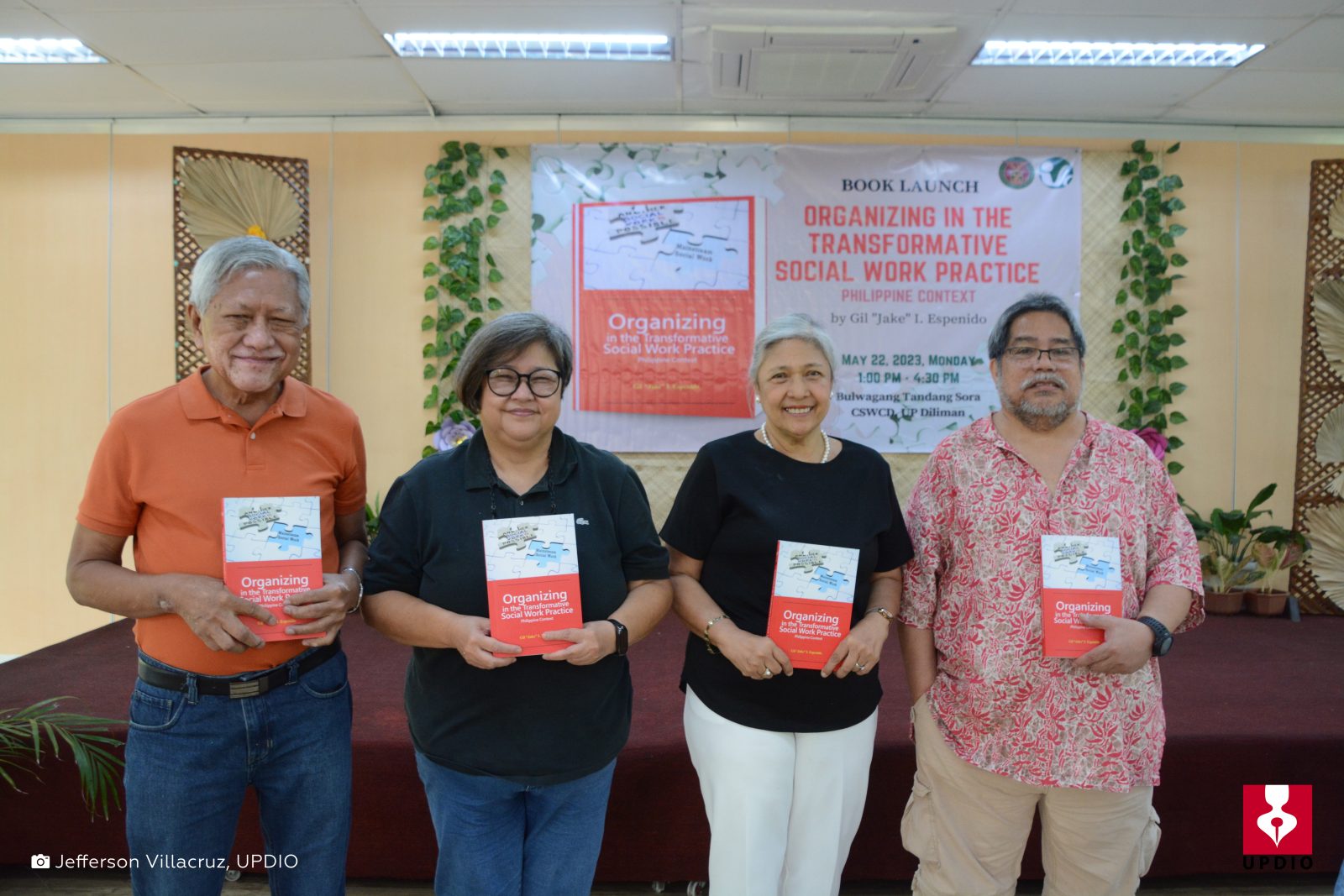The book Organizing in the Transformative Social Work Practice: Philippine Context (Organizing) was hailed as a life-changing work by the whole UP Diliman (UPD) College of Social Work and Community Development (CSWCD). For author Gil “Jake” I. Espenido, it is a book largely inspired by living and working with the masses.

“Ang may-akda [ng libro] ay iyong masang inaapi. Ang ginawa ko na lang ay balikan ang mga nangyari, ang mga karanasan na kasama sila. Sa punto de vista ng prinsipyo at pananaw, kung hindi ako nagkaroon ng pribilehiyo na makasama ang masa sa ilang dekada, hindi ko maisusulat ang libro. Kuwento talaga nila ang nasa libro,” Espenido said. “Ang pinakamahusay pa ring guro ay ang masa,” he added.
Espenido explained that he wrote the book from 2020 to 2022.
“Sa pagsusuri natin, ang organizing pala ay may isang progresibong katangian at isang mahusay na tradisyon noong mga 1970s. Sa takbo ng taon ay kinopya ito, hinigh-jack ito, at pinalambot ang kahulugan, laman, at praktika nito ng iba’t ibang mga aktor sa level ng international, financial institutions sa ilang mga private funding agencies, sa ilang mga non-government institutions. Sa dulo, napakalinaw noong shifting from politics of resistance to politics of cooperation,” he said.
Espenido explained that the book contains a convergence similar to what is known as organizing and transformative social work practice.
“Sinikap ko sa libro na merong convergence at kapareho sa sinasabi nating organizing at transformative social work practice. Ang dalawa ay makikita natin at sinisikap natin na mabuo, mapundar sa loob ng relasyon sa pagitan ng mga tao na mayroong depenidong komunidad,” he said.
Espenido added, “Ang genuine organizing at transformative social work practice ay malinaw sa pagtigil ng sinasabi nating depoliticization process—ito iyong mulat na pagtanggal ng aspekto ng politika sa pagsusuri ng mga isyu, individuals, at mga pangyayari. At nagaganap din ito sa sinasabi nating direct community work at sa delivery of social services.”

An associate professor of social work at the CSWCD Department of Social Work (DSW), Espenido is also a seasoned sectoral organizer. He has worked on establishing people’s movements and organizing movements among the youth sector, students, fisherfolk, farmers, urban poor, and indigenous people in Luzon, Visayas, and Mindanao. He also closely coordinates with the Muslim community.
“Niri-reiterate ng libro ang organizing sa context ng transformative social work at paano natin gagamitin ang bilang ng numerical superiority ng mahihirap, inaapi, at pinagsasamantalahan para maging materyal na puwersa na magiging prerequisite sa pagbabago ng lipunan para sa ikabubuti ng mga pinagsamantalahan at inaapi,” he said.
The book contains 24 chapters with topics that include the establishment of social work in the Philippines, ideological blindness in social work, the colonial heritage of social work, and the various participation of social workers in the different poverty alleviation programs of the government, among others.
Espenido explained that social work depends on who uses it.

“Sa isang progresibong lente, pwede mo talaga i-develop siya sa isang progresibong landas. Pero kapag gagamitin siya sa isang rightist na puwersa and entity, talagang matindi rin ang aabutin ng masa from deception hanggang doon sa containment of human rights,” he said.
Former CSWCD dean Jocelyn Caragay, who reviewed the book, said it presents a rich discourse on transformative social work in the light of critical social work, radical social work, and a strong Marxist orientation.
Caragay also said she liked the line in the book saying social work cannot be neutral.
“It has to delve into the political, structural roots of the problem faced by our society. The book is a life-changing piece for the profession. The presentation of the transformative perspective is a worthy contribution to the social work practice in the Philippines especially that local materials are scanty. Let us remember the line in the book, get to the roots of our social problem towards societal transformation,” she said.
Meanwhile, Professor Emeritus Sylvia E. Claudio of the CSWCD said Espenido is clear in his analysis of the problems the country as a neocolonial society.
“It remains feudal and that is the source of oppression and therefore iyong mga gawain ko, iyong iba ko pang teorya at layunin ng social work practice ay tapusin ang neocolonialism and feudalism problems ng Pilipinas. You can agree or disagree but it brings our discourse to the level in which all of us, especially as a national university funded by our people… must all think about the problems of the Filipino people and how the knowledge that we create as a university ethically transparent and responsible for ending those problems. Ito iyong nagustuhan ko sa libro,” Claudio said.
Professor Emeritus Angelito Manalili of the CSWCD said the book continues the tradition of the university in being a social critic.
“Ang katotohanang may systemic at historic na karakter ang konteksto ng pagpapaunlad ng pamayanan at gawaing panlipunan na, sa ayaw at gusto natin, ay ibayo pang umunlad nang tayo ay patuloy na yumabong hanggang sa magkaroon ng pangatlong departamento na lalong nagpakita sa papel ng kababaihan at ng kasarian kapag pinag-uusapan ang pag-unlad nang walang naiiwan at napagkakaitan,” he said.
Meanwhile, DSW chair Anna Teresa L. Prondosa said the book is an inspiration to the whole CSWCD community.
“Nais po naming ipaabot na hindi lang po ito isang humble contribution sa departamento, isa po itong inspirasyon sa fakulti, komunidad, at sa mga mag-aaral,” she said.
The book was launched on May 22 at the CSWCD. Interested parties may avail of the book at the CSWCD with contact number 8981-8500 local 4103.
